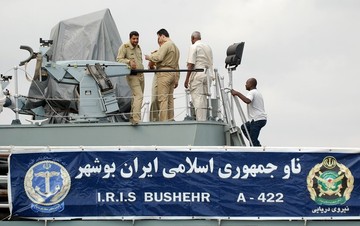Two Iranian navy ships dock at Port Sudan – army spokesman
September 18, 2013 (KHARTOUM) – The Sudanese army on Wednesday confirmed that two Iranian navy warships docked at Port Sudan today describing it as a “routine and periodic” stop.
 “Two Iranian ships entered our territorial waters, one destroyer and the other a logistic ship,” Sudan army spokesman Colonel al-Sawarmi Khalid Sa’ad said before adding that the purpose of the visit is to refuel and restock supplies of food and water.
“Two Iranian ships entered our territorial waters, one destroyer and the other a logistic ship,” Sudan army spokesman Colonel al-Sawarmi Khalid Sa’ad said before adding that the purpose of the visit is to refuel and restock supplies of food and water.
Iran’s state news agency (FARS) said that Iranian Navy’s 27th fleet of warships comprising of Khark helicopter carrier and Sabalan destroyer stopped in Port Sudan after a one-month sailing of 2,600 miles “in order to send Tehran’s message of peace and friendship to the regional states and strengthen ties with Khartoum”.
“On its path to Sudan, the flotilla of warships intercepted over 43 military units and escorted more than 14 cargo ships and oil tankers,” FARS reported.
It noted that the Iranian Navy in August dispatched its 27th flotilla of warships to the high seas to protect the country’s cargo ships and oil tankers against pirates.
The Iranian navy officials also held talks with their Sudanese counterparts upon their arrival in Port Sudan.
Official sources told Sudan Tribune that the Iranian Navy ships arrived as part of a military cooperation agreement between the two countries which includes the training of pilots, security forces and police in addition to cooperation in the field of military industrialization.
The sources denied that the ships are loaded with long-range missiles destined for Islamic militant group Hamas in Gaza or the Sudanese army.
They went on to say that the two countries support the line of the resistance in Palestine and opposition to Western presence in the region, in addition to Sudan’s support for Iran’s peaceful nuclear program.
Iranian warships, which regularly patrol the Red Sea, docked in October and December 2012 in Port Sudan. The first visit took place days after the bombing of a weapons factory in Khartoum. Sudanese officials at the time accused Israel of conducting the airstrike.
Khartoum’s links with Tehran have been met with suspicion, particularly in the Gulf.
The Saudi pro-government Al-Riyadh newspaper blasted Khartoum over the Iranian warships, questioning the logic behind the relationship between the two countries in a heavily critical editorial published that month titled “The fall of masks between Iran and Sudan”.
“Bashir’s government resorting to a state that is in political and security odds with most Arab countries has no logical justification,” the newspaper said.
The editorial accused the Sudanese government of “conducting naive policy”, saying it had turned the country, despite its enormous potential, into a marginalised nation that is unable to attract Arab or foreign investors.
Last month, Sudan said Saudi Arabia blocked Bashir’s plane from entering its airspace as he tried to fly to Iran for the inauguration of President Hassan Rouhani.
Riyadh said that Khartoum failed to obtain flight clearance in advance and denied that there are any political motives.
(ST)
